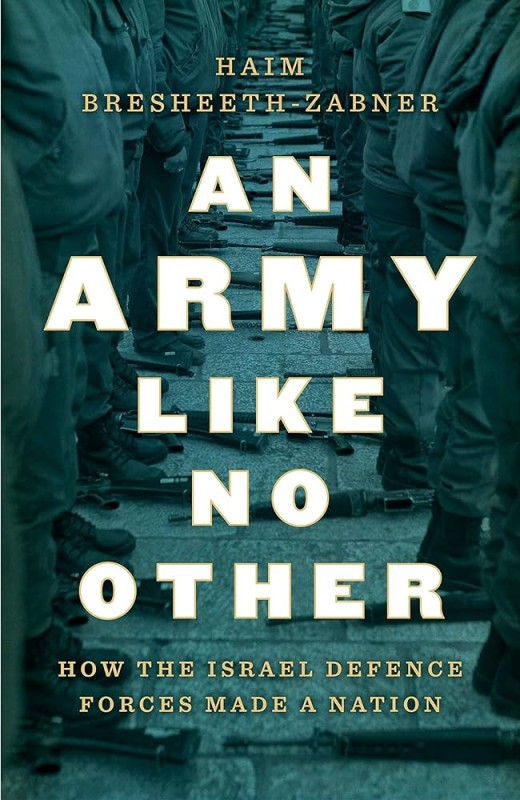An Army Like No Other: How the Israeli Defence Forces Made a Nation by Haim Bresheeth Žabner provides a thought-provoking and comprehensive exploration of the Israeli Defense Forces (IDF) and its profound impact on Israeli society and the nation’s history. As the child of Holocaust survivors who settled in Palestine in 1948, Žabner offers a unique perspective.
Initially embracing the Zionist agenda, Žabner became disillusioned during his conscription into the IDF in the 1967 Arab-Israeli war. Serving in the Golan Heights, he witnessed disturbing war crimes committed by the IDF.
The book delves into Israel’s formation, the establishment of the IDF, and the role of Zionist settler-colonialism and violence in asserting and expanding Israeli power. Žabner’s historical analysis highlights the foundation of Zionism on anti-Semitism and explores how Israeli society accepts the Zionist narrative through crucial roles played by schools, communities, and the IDF.
Read: Ten Myths about Israel
The book traces the origins of the IDF, connecting it with Zionist paramilitaries like the Palmach and Haganah, and emphasizes how impunity for actions like the Nakba became ingrained in Israeli settler-colonial society. Žabner underscores the integral role of military violence in any settler-colonial project, arguing that it is the linchpin without which such endeavors would be impossible.
However, it’s important to note that the book is not a military history but rather a social history of Israel through the IDF. The author identifies the IDF as the most constant institution in Israel’s 75-year history, receiving 96 percent of Jewish support.
Expanding on this premise, Žabner argues that the IDF is not only a formidable fighting force but also the core ideological, political, and financial institution of Israeli society. The IDF’s influence permeates every facet of Israeli life, emerging as one of the nation’s most profitable and influential industries. It is the institutionalized legacy envisioned by Ben-Gurion to create the Israeli nation and society, as he believed ‘the whole nation is the army.’
Žabner contends that the IDF is Israel’s machine of social engineering, tasked with rewriting history and replacing 2,000 years of history with a myth history. The book explores how Zionism attempts to establish legitimacy as a “liberation movement” through mythologies of heroism upon which the IDF was founded.
The historical account traverses the IDF’s evolution from the Nakba to conflicts in Egypt, Lebanon, Iraq, and Gaza, illustrating that the state of Israel has been shaped by its wars. According to Žabner, Israel acts as if peace is not only unobtainable but also undesirable, often utilizing war normalization discourse.
Each war expands the Zionist project and introduces new elements to the Arab-Israeli conflict while continuing the narrative of the previous one. The book also examines the military–industrial complex, detailing how Israel has turned its war-machine into a lucrative business and tool for diplomatic and political global outreach.
In the exploration of Israeli society, the book focuses on defining communities and ongoing tribal warfare for control and influence. It delves into the enduring conflict between the Ashkenazi leadership and the Mizrahi disenfranchised underclass, highlighting how this intra-Jewish tension has deeply shaped Israel.
Despite some transformation of racist conditioning, underlying sentiments persist, with tensions escalating after the large Ashkenazi immigration from the former Soviet Union in 1991, exacerbating existing fault lines.
The book also emphasizes the racialized experiences of Palestinian citizens of Israel, who have historically faced inequalities and disenfranchisement, including living under a military government for the first two decades of Israel’s existence.
Challenging Israeli claims of being “Jewish and democratic,” Žabner argues that Israel has become a fully-fledged apartheid state, both in practice and de jure, drawing parallels with South Africa. The book examines how racist legislation has institutionalized legal apartheid, reinforcing the antidemocratic nature of the settler-colonial regime.
Adding a left-wing perspective, Žabner critiques liberal Zionists who argue for a “humane” or “liberal” Zionism, contending that such positions deny the inherent inequalities within the Zionist project. He challenges the narrative of equality propagated by liberal Zionism, asserting that it serves as a cover for actions violating human rights and international law.
In conclusion, An Army Like No Other provides an eye-opening examination of the IDF and its role in shaping Israel. Žabner’s work challenges conventional assumptions about true peace in the region, calling for a reevaluation of these notions from an informed historical perspective.
Haim Bresheeth Žabner, An Army Like No Other: How the Israeli Defence Forces Made a Nation (Verso, 2020) ISBN: 9781788737845, 448 pages
Recommended





